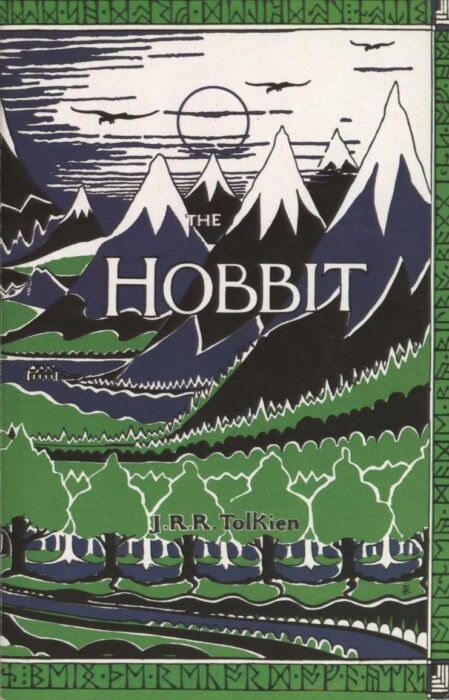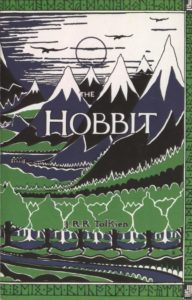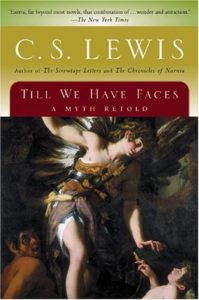Lewis and Literature In The Library
Work continues to collect all published, Christian speculative stories in one place — the Speculative Faith Library.
That project has taken some time. We’ve been keeping it updated with newer novels, such as Eye of the Sword by Karyn Henely and Rift Jump by Greg Mitchell, while also adding older and classic titles. For instance, only recently is the Library listing what is, I believe, every single work of fiction by C. S. Lewis, including The Cosmic Trilogy and The Chronicles of Narnia series, The Screwtape Letters, The Great Divorce, and Till We Have Faces. Before that come J. R. R. Tolkien’s works; in fact, if you sort all books with the oldest ones first, the only authors you will find are:
-
J. R. R. Tolkien. (Currently The Hobbitis listed as the very first work of “modern” Christian speculative fiction.)
- C. S. Lewis. (Also currently, Out of the Silent Planet is listed as the second work of “modern” Christian speculative fiction.)
- Madeleine L’Engle.
- Stephen Lawhead.
A few bits of trivia come up thanks to the Library’s unique organization:
- Tolkien’s The Lord of the Rings was published contemporaneously with The Chronicles of Narnia. Somehow I, anyway, had always assumed one preceded the other.
- According to the Top Authors “cloud” box to the right of all library pages, Stephen Lawhead has written the most novels of all.
- Left Behind series primary author Jerry B. Jenkins seems to be a close second.
- Of library books entered so far, fantasy easily wins over science fiction.
Which have you read? What works are your favorites? Which stories do you hope to read?
Meanwhile, a few new features are at the library. You may have noticed that books whose authors have written guest columns here will have their bio and links included on the listing page. They also have their columns automatically displayed. Well, now more feature boxes will also recognize any blog discussions tagged with the name of an author or his/her book. Eventually, each Library novel listing may serve as a kind of “IMDB” for Christian speculative novels, giving you anything you’d want to know about a book’s themes, genres, author, creative process, trivia, audiences, and publishers.
As always, we want to feature your novel reviews, even if they have been previously published at your own website or on another site such as Amazon or Goodreads. Write a comment after a book you’ve read, or even better, submit your novel review. And if you haven’t yet seen your favorite published, Christian speculative novel in the Library, tell us about it — submit a novel.































Thank you for all your hard work. This site is an amazing resource!
J.R.R. TOLKIEN
The Lord of the Rings
The Silmarillion – Some very interesting stories but an incredibly dry and difficult read. I’ve found I don’t really care for elvish history (ha!)
The Hobbit
Unfinished Tales – Some parts were interesting but mostly too much detail
C.S. LEWIS
The Chronicles of Narnia – Life-changing, faith and imagination-building books
The Cosmic Trilogy – Don’t care much for the first book; love the latter two
The Screwtape Letters/Screwtape Proposes a Toast
The Great Divorce
The Dark Tower – Intriguing as all else but unfinished…
Boxen – Clever for a young child but seriously dull
Mere Christianity
The Abolition of Man – An incredibly difficult and dry read; some interest
Surprised by Joy – Truthfully, mostly incredibly boring
MADELEINE L’ENGLE
A Wrinkle in Time – Some great ideas marred by basic writing and a few non-Christian ideas (not the witches)
STEPHEN LAWHEAD
The Song of Albion
Taliesin – Gorey but incredible.
Favourite Tolkien works? The Lord of the Rings, parts of The Silmarillion
Favourite C.S. Lewis works? Most of them but particularly The Chronicles of Narnia, The Great Divorce, The Dark Tower, Perelandra and That Hideous Strength. In terms of non-fiction – Mere Christianity
I plan on reading the rest of The Pendragon Cycle sometime soon
Favourite Stephen Lawhead works? Haven’t read many of them. The Song of Albion is very good though.
I hope to read more C.S. Lewis books, especially Till We Have Faces (I tried it some years ago and grew bored very early on. I wish to give it another try).
I hope to read the rest of the Wrinkle in Time series because the concept was interesting but not properly developed enough for my liking.
I hope to read the rest of Stephen Lawhead’s Pendragon Cycle and maybe some other books by him.
But my current reading list is already rather long, so these may have to wait a little.
Give it another try! It was an exhilarating experience, just months ago. It also helped me to have heard exultant recommendations by my wife, and many NarniaWeb members, and an introduction to the basic Cupid-and-Psyche myth by my wife.
So far I have only read one Lawhead book, the first of The Song of Albion series. I’m not sure why I didn’t go after the next two. I do recall the writing being very “high,” and either that didn’t work so well or I wasn’t able to climb that far at the time. What struck me most was Lawhead’s very strong presentation of a dull, plodding, weak sort of life, in offices and wordiness and dry books, compared with the strength and luster of life in a Celtic/medieval fantasy world, with all its power and dirt and blood and weariness and masculinity. It’s a theme I’d like to explore more.
Book 1 of Albion is great. Book 2 is pretty good. Book 3, he forgot everything that happened in books 1 and 2, along with all of the character development. I kept going, “But, but wait! What about such and such in book 2??” Also I get so sick of Lawhead’s voice after a while. The only book of his I’ve ever really, really enjoyed was Byzantium. (I tried to read a World of Warcraft novel right after, and I couldn’t figure out why the head-chopping seemed so mild. Then I realized I was comparing it to Lawhead’s lovingly graphic depictions of spraying blood and splattering entrails.)
Don’t ever read Dream Thief by Lawhead. It’s like he published his first draft and all the editor did was spell check it. When the villagers killed the aliens with pitchforks and hoes, I was finished.
Stephen Lawhead might be the author who has the most bizarre combination of inspiring/dull books in my opinion.
Taliesin and Merlin are near perfect books in my mind. I enjoy them to the point of not being able to articulate why. I also like the first two of his Robin Hood trilogy (haven’t read the third yet) and have read the Pendragon series several times (vastly entertaining even if it strikes me as a bit amateur now).
On the other hand, I couldn’t get past the first few pages of Avalon, the first Song of Albion book or series-I-can’t-remember-the-name-of. They did not engage my interest at all. I downloaded a sample for Dream Thief and ended up deleting it mostly unread.
Skin Map was okay but I’m not particularly interested in reading the rest of the series.
I’m trying to read more Christian fiction, and I post my reviews all over the place once I’ve read them. Spiritfilledkindle.com tracks what ebooks go on sale or free on Amazon, and I’ve scooped up quite a few free Christian spec fic books.
I notice there’s a huge dearth of modern/urban fantasy, especially in the YA genre. Everybody seems to produce high fantasy instead, and that’s not what’s popular. I’m looking forward to more urban fantasy (Rift jump is a step in the right direction, though!)
So far I haven’t seen much real Christian high fantasy, not on the level of Tolkien. (I am not saying this is a problem, necessarily.) What I see instead are imitations that seem to aim for some point between the true “high fantasy” of The Lord of the Rings and “simpler fantasy” such as The Chronicles of Narnia. Rather than achieving exact balance, to switch metaphors, such works seem lukewarm to me. Switching again, they reflect the shortcomings, not the strengths, of either story type.
I’m with you in that more original fantasies/speculations/hybrids would be welcome. The standard medieval/royalty/lost princes/knights approach doesn’t appeal to me. Yet that is only my opinion, likely because I had my “medieval” story “quota” already filled by Middle-earth and Narnia, without much room for more!
But consider this: not even those classics are purely medieval. Does Narnia have “knights”? Yes — and the most famous is a talking mouse. What about Middle-earth? Yes, but they are of Gondor, a unique and almost non-medieval culture; other warriors, of other cultures, could hardly be called medieval. Middle-earth is a wholly realized and wondrous creation, not merely another place of castles and moats and dragons and knights and jousts and things. Its diversity hardly recalls a “medieval” setting; medieval icons and values are merely a subset of the whole.
By “high fantasy”, I mean the medieval setting with knights and lords and possibly elves and dragons. Dragonlance and the like falls into high fantasy. It’s just a genre classification.
A lot of secular YA and middle-grade books are modern fantasy, and I luffs them. Harry Potter, Fablehaven, Twilight, the Wednesday Tales, the Ashtown Burials, Inkheart, Percy Jackson and the Olympians, and the list goes on. They take place in our modern day, with a fantastic twist (the divine lineage, the hidden preserve for magical creatures, the hidden city for imprisoning immortals, the hidden school for wizards, the vegetarian vampires).
Yet I’m not seeing a lot of that sort of thing coming from Christian authors. They’re all stuck writing Dragonlance. I keep wanting to grab people and shake them. “Don’t you READ??”
Actually, there are quite a few modern fantasies out by Christian Authors:
The Bright Empire series by Stephen Lawhead
The Earth Painter by Melissa Turner Lee
The Faery Rebels books by R.J. Anderson
An upcoming series by Jill Williamson through Zondervan
Shades and Powers by John Olson
The Berinfell Prophecy Series by Wayne Batson and Christopher Hopper
The Door Within Series by Wayne Batson
Dragons in our Midst by Bryan Davis
I’m sure there are more, but those are the ones that come to mind at the moment.
It seems to me that those who love speculative fiction are a very diverse group: one wanting science fiction, another fantasy, another high fantasy, another steampunk, another YA, another space opera. Whew! I don’t think those who love Amish fiction are quite so diverse lol.